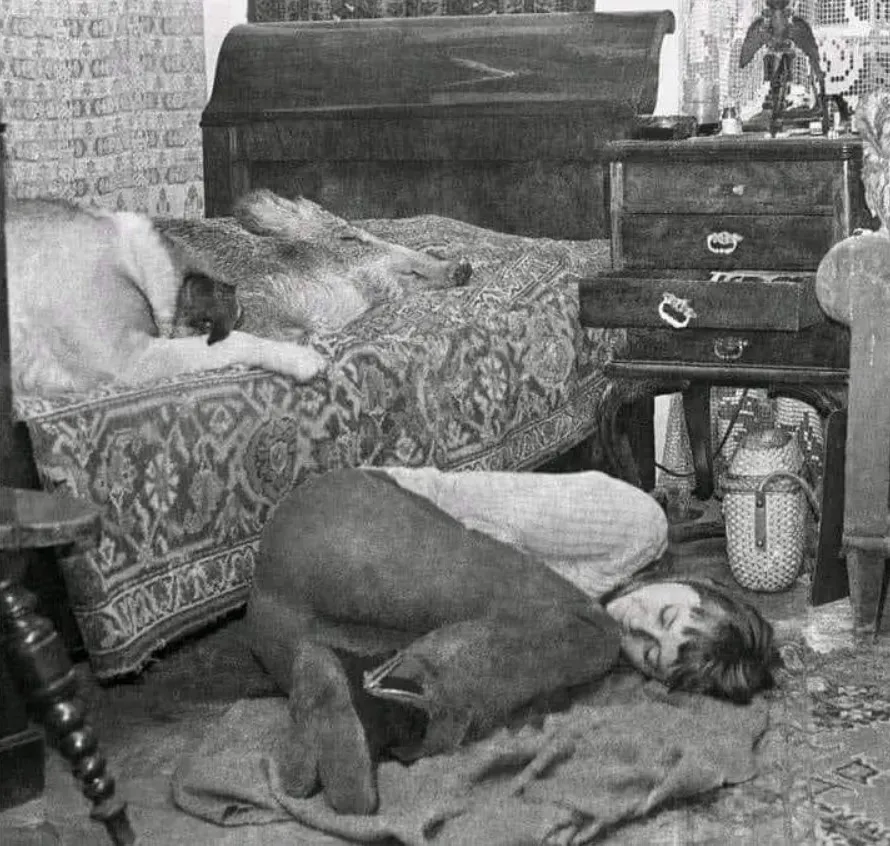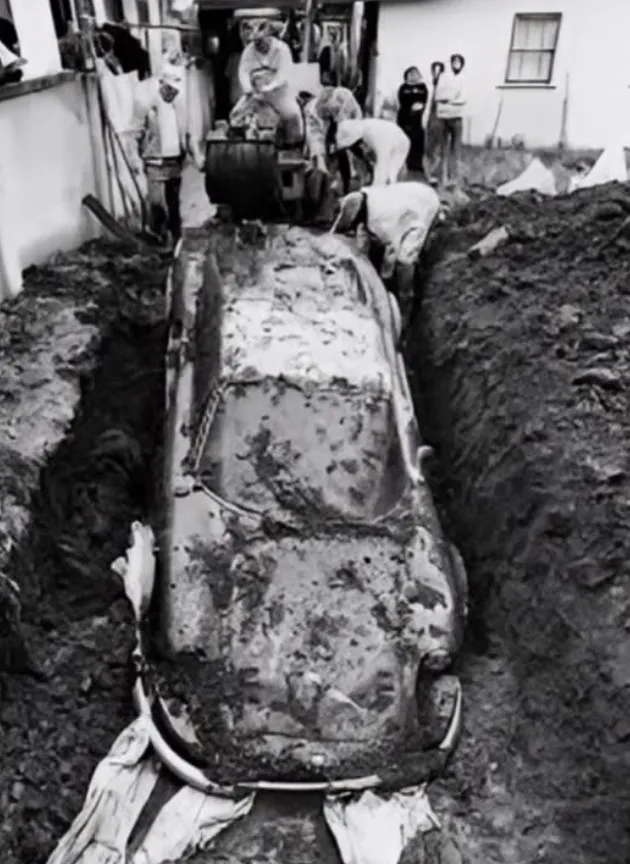“The Day a Bear Returned a Favor” 820

The rivers of Alaska are wild and cold, their waters rushing with the strength of untamed earth. For generations, men have come to these streams with rods and nets, hoping to draw from them the silver flash of salmon. But for one fisherman, a simple trip to the river turned into a story of wonder—one that blurred the lines between human and animal, between instinct and something far deeper.
He was fishing alone, not far from where the great bears of Alaska roamed. They were a constant presence in this part of the world—sometimes only shadows in the trees, other times lumbering giants crossing the shallows with practiced ease. He knew to keep his distance, to be cautious, to remember that this was their land as much as his. Yet one afternoon, his eyes fell on a bear that did not move with the heavy confidence of its kind. It lingered on the edge of the forest, ribs faintly visible, its frame thinner than it should have been.
There was no growl, no charge. Just a hungry stillness.
Something inside the man stirred. Compassion overcame caution. With careful steps, he placed one of his catches on the riverbank, setting it down gently before retreating. The bear waited. Then, slowly, it moved forward, scooped up the offering, and slipped back into the trees. The man watched in silence, unsure if he had done something foolish or something necessary.

The next day, it happened again. The same bear. The same quiet hunger. Again, he laid down a single fish. And again, the bear accepted and left without menace. A pattern formed. For several days, the fisherman and the bear shared this silent exchange: one fish, given freely, one life, eased a little by kindness.
The man thought little of it beyond the moment. He felt no expectation, no bargain. He was simply responding to a creature in need, offering what he could spare.
But then came the morning when he stepped out of his tent and saw something waiting for him. Resting on the dashboard of his car was a fish—freshly caught, its scales still glistening. He froze, staring at it in disbelief. He had not left it there. No one else was near. The forest was empty of people. Confused and unsettled, he turned to the trail camera he had set up, its lens pointed toward the clearing.
The footage told the story.

In the quiet of night, the bear had returned. But this time, it did not come for food. Instead, it carried a fish gently in its jaws. Approaching the man’s car, it rose on its hind legs and placed the fish carefully on the dashboard. Then, without fuss or noise, it slipped away into the dark, leaving behind a gift.
The man watched the recording again and again, stunned. A wild bear, an animal of instinct and survival, had brought something back to him. Was it repayment? Recognition? A gesture of gratitude in the only way it knew how?
He did not have answers, and perhaps none were needed. What mattered was the act itself: a kindness returned in the wilds of Alaska, where life is often a struggle and survival leaves little room for generosity. In that moment, the man understood something profound—that compassion does not vanish in the wilderness, and that sometimes, even among creatures we fear, kindness can echo back.
The story of the fisherman and the bear lingers not because it can be explained, but because it cannot. It reminds us that the world is still filled with mysteries, that the connections we make—whether with each other or with the wild—are more powerful than we often believe.
For the man, it was just a fish. For the bear, perhaps it was just instinct. But together, on a quiet Alaskan morning, it became something more: a reminder that even in the harshest places, generosity can find its way home.
Riley Green’s Quiet Act of Kindness in an Empty Stadium 844


When the last song fades and the stage lights dim, most concerts end the same way. Security begins ushering people out, crews start breaking down equipment, and the artist is whisked away behind closed doors. The night becomes a memory, and the performer disappears into the distance. But one night, Riley Green showed that sometimes the truest part of country music isn’t in the spotlight, but in the quiet moments after.
The show had been a success—thousands of fans filling the stadium, singing along to every lyric, waving phones in the air as the music rolled across the crowd. Energy poured from the stage and came back like a tidal wave. Riley, as always, gave his all. But eventually, even the loudest nights wind down. The encore ended, the applause softened, and the audience spilled out into the night air.
By the time the last groups of fans shuffled to the parking lot, the stadium was nearly empty. The cleaning crews moved in, security swept the aisles, and silence replaced the roar of music. Riley Green, like most artists after a show, was expected to vanish into the shadows, heading back to his team and the life that exists beyond the stage.

But that night, something reached his ears. A message filtered through the crew—a girl was still waiting. She hadn’t left with the crowd. She was alone, sitting quietly in the emptiness of the stadium.
It wasn’t unusual to hear about fans lingering, but most artists never know. Even if they did, few would break routine to act. Exhaustion after a show is real, and schedules are tight. It would have been easy—expected, even—for Riley to move on. No one would have faulted him. No headlines would have been written.
But Riley Green didn’t walk away. He turned back.
There were no cameras to capture what happened next, no media team arranging perfect angles, no fans shouting for attention. Just an artist walking into an empty stadium, the echo of his footsteps the only sound, to meet a girl who had waited long after everyone else was gone.
When he reached her, she lit up—not with the explosive energy of a crowded meet-and-greet, but with the quiet, trembling joy of someone who had been seen. Riley didn’t rush. He didn’t treat it like an obligation. He stopped, he spoke, and in that moment he gave something more lasting than a song.
The kindness wasn’t in grand gestures. It was in the simple act of coming back, of making time when no one was watching. It was the essence of country music itself: sincerity, humility, and the belief that every person matters.

For the girl, it was unforgettable. For Riley, it was natural. And for anyone who has ever loved country music, it was proof that the genre’s heart still beats in those who carry its traditions forward.
The industry today often moves fast, polished and packaged for clicks and headlines. Too often, authenticity gets lost behind bright lights and big productions. But country music has always been about something different. It’s about the songs that echo through small towns, the values passed from one generation to the next, and the simple truth that people deserve to be treated with dignity. Riley Green embodied that truth when he chose kindness over convenience.
Stories like these rarely make it into official press releases. They aren’t rehearsed, they aren’t staged, and they don’t fuel record sales. But they matter. They ripple outward, carried by the people who witness them and the ones who hear about them later. They remind fans why they connect with an artist in the first place.
For Riley, the gesture was probably small—a few minutes stolen back from the whirlwind of a tour. For the girl, it was everything. It was proof that her waiting meant something, that her voice wasn’t drowned out in the crowd, that the man whose songs had touched her heart cared enough to come back.
The scene itself was unremarkable to anyone else: an empty stadium, one fan, one artist. But that is what made it powerful. It wasn’t about spectacle. It was about humanity. It was about a reminder that the stage doesn’t have to create distance. That sometimes, when the music stops, the heart of country music is found in the silence afterward.

As word spread, fans responded not with surprise but with recognition. This is what they expect of Riley Green. He has built his career not only on songs that resonate, but on the kind of grounded humility that makes moments like this possible. The kindness was not out of character—it was who he has always been.
Country music has thrived for generations because it stays rooted in values that matter: honesty, loyalty, humility, and kindness. Those qualities don’t fade with fame. They endure in artists who remember where they came from, and who see their fans not as numbers in a crowd, but as individuals worth caring about.
Riley Green’s return to that empty stadium was more than an act of kindness. It was a statement, even if he never intended it as one. A statement that the heart of country music is alive. That even in an era of celebrity walls and quick exits, the true measure of an artist is found in the moments no one expects and no one records.
The girl left the stadium that night with more than a memory of a concert. She carried proof that her devotion mattered, that sometimes waiting alone in the dark is rewarded by light. And Riley left with nothing more than what he started with—his integrity, intact and unquestioned.
For most people, the concert ended hours earlier. For one girl, it ended with a memory that will last a lifetime. And for country music, it was a reminder of what has always made the genre special: a heart that beats strongest not under the stage lights, but in the quiet, unseen moments of kindness.
Because in the end, the story isn’t about an artist and a fan. It’s about what happens when you live the songs you sing—when humility and humanity walk back into the stadium long after the crowd has gone.
And Riley Green did just that.





